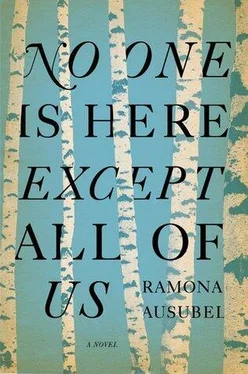Igor’s dream took absurd turns of loveliness. He and his personal guard went for the tour. Igor was shown the taverna where he could have his wine, the market where he could buy his cheese and the bakery where he could buy his bread. All the people in town shook his hand, because he was their prisoner.
The guard showed him which bench was best for watching the girls coming out of the place where they did the wash, which bench was nicest in the morning to drink your coffee. “I was thinking about it, and it’s likely that we’ve saved your life,” the guard said. “You are a very lucky man.”
Here he was in the most foreign of foreign lands, a place filled with outlandish sunshine. A place with its own ocean. A place where there was a man in charge of one thing — making sure Igor was taken care of. And somehow Igor was supposed to believe that this was because of a devastating war? Because millions of people were dying? Because he was a prisoner of war?
Igor decided to wait patiently to wake back up into his old, gray life. A person does not get lifted to salvation this easily.
The guard showed Igor to the jail where he would sleep.
“Will anyone else come?” Igor asked, looking at the six bunk beds.
“No, not that we know of.”
Igor had thought of a sure way to reveal the guard’s kind exterior as false, to stretch the membrane of the dream until it burst. “I hate to say, but is there a larger bed someplace?”
“A larger bed?”
“I love to sleep. It’s what I’m best at. Usually, and I hope I don’t sound ungrateful, I like more room so I can spread my legs out.”
The guard looked at the cot. “I will see what I can do.”
Igor felt a strange hum in his head, disbelief rumbling like the engines that brought him here.
Within a day Igor was helping several men carry the bunks out and carry in the four-poster of a recently dead old woman. The guard borrowed blue sheets and white cotton blankets from his mother, which he and Igor tucked in around the mattress, snug. The pillow remained — a pillow is the same size no matter the bed it lives on.
Each night, the guard came and locked Igor into the cell and each morning he came and released him. They went for their coffee and they sat on the rocks by the sea, where the guard taught Igor his spiking, giggling language.
“Tell me again how I am here? Why I am here?”
The guard told the story the same way it had been told to him.
The island boys had fought a losing battle far in the north. Their side had sustained hundreds of thousands of casualties, and three of the island boys, just three, walked out on their own feet. For months, they hid in a fallen-down building and gathered parts to fix their car so they could get home. They had no radio, no idea what was going on anywhere. They could not get their heads back after so much death. Finally, the motor turned over and they drove for two days without sleeping, without speaking. At the foot of a mountain range, exhausted and filled with the rabid, manic combination of the elation and guilt of survivors, they bought two jugs of vodka from a band of Gypsies, and that night, as they made camp, the boys emptied them.
Drunker and drunker, they replayed the deaths of their friends, the rotted bodies they had seen, the enemies they had drained of blood. We must deserve something, they said. A little honor. A small trophy. Somewhere in that stupor, it made sense to go looking for one.
Morning slipped in too early and revealed a man tied to a tree, blindfolded, with blood dripping down his face. The soldiers remembered only vaguely how he had come to be there and disagreed about what to do with him. It was the war itself that made the best case: life is disposable, nearly meaningless. Every day, thousands more are extinguished, captured, maimed. Everyone on this continent is marked for death. How much could it hurt to take a single little prisoner?
Sometimes it happens that two very different stories, two distant lives, come crashing together. Once, there was a sleepy man who had lived in a brand-new world until he was reeled out like a caught fish. And once, very, very far away, on a scrubby island floating in the black-blue sea, there lived a lonely young jailer who had no prisoners, had never locked the door on a murderer, an adulteress, even a petty thief.
All through the winter and spring, the summer and fall, the jailer had swept and paced the cell. He had washed the walls, which were already clean. He had polished the stone floor. All through the winter and spring, the summer and fall, the other island boys had inched closer to the night they would seek a reward. All through the winter and spring, the summer and fall, Igor had practiced being sound asleep.
Perhaps Igor and the jailer’s fate was an answer from God. Perhaps the entire architecture of the war was built to land a single body in a single cell. Or perhaps fate is nothing more than an accident — two ships lost in the dark, running aground on the same windward beach.
Igor thought about what the scene of his capture had looked like: the villagers cementing stars in place, the room turning slowly into the heavens, no talking, only the scrape of tile. Enter soldiers, exit soldiers, Igor, just awake, in tow.
“Was I asleep in the story?”
The guard squinted at him.
“All right, then,” Igor said, deciding he liked his portrayal better in the soldiers’ version of the story. “But if I am supposed to be your enemy, then will you kill me?”
“No, certainly not. Maybe a life sentence with no possibility of parole. You are useless to me dead.” Even the guard’s eyebrows were thin and unthreatening. “Anyway, why would you want to leave?” He gestured around them at the thyme-dry hills and the blue and bluer sea.
“I have a family. I have a home.” Igor thought for a moment. “When you say there is a war, do you mean a real war? Horror and all that? Death?”
“You haven’t seen the pictures? Hitler, Churchill? Mussolini? Stalin?” Igor was quiet. He rolled his sleeve up and examined the rope burns on his wrist. They stung at his own touch. “I knew your village was far away, but I didn’t know it was that far away.”
“It doesn’t look like war here,” Igor said, and put his face up to the dry, warm day.
“Of course. This is the best place on earth,” the guard said.
“I have a new baby boy. And a wife, and a bigger son.”
The wind brushed a little of the heat off their bare arms. The guard looked ashamed. Small beads of sweat popped and trickled down his forehead, which made Igor inexplicably sad. “That’s a nice breeze,” Igor said, surprised by his sudden desire to be kind.
“Is there anything you aren’t satisfied with? About your experience? It must have been a bumpy ride.”
“I am asleep,” Igor reassured himself. “I am asleep and I am dreaming.”
In the afternoon they ate a large lunch at the guard’s mother’s house. She fed them bean soup, pasta, baked chicken and a custardy dessert. She told Igor, “If you can tell me you eat better at home you can go back. You will be freed.”
“Mother,” the guard scolded, “he is our prisoner, you can’t go freeing him.”
“He won’t go anywhere, because there is no way he eats better at home,” she assured her son.
They both looked at Igor, whose chest was covered in crumbs, a trail of fallen soup leading the way to his lap. He shook his head. “It would be a lie,” he confessed, spooning another bite into his hole of a mouth. “I have never eaten such a meal.”
“Then he stays,” the guard’s mother said. “I told you.” To Igor, she said, “This is what I can do with wartime rations. Just imagine my table in better times.”
Читать дальше












